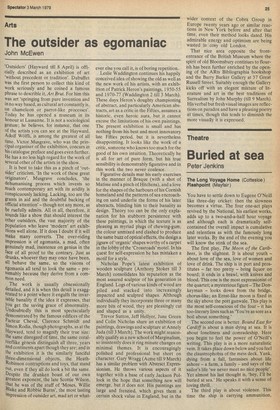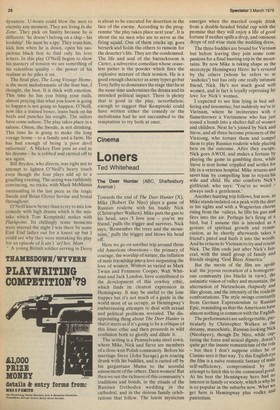Buried at sea
Peter Jenkins
The Long Voyage Home (Cottesloe ) Flashpoint (Mayfair) You have to settle down to Eugene O'Neill like three-day cricket: then the slowness becomes a virtue. The four one-act plays revived by the National, his earliest works, adds up to a two-and-a-half hour voyage and although each is dramatically selfcontained the overall impact is cumulative and relentless as with the famously long later works. By the end of the evening you will know the stink of the sea.
The first play, The Moon of the Caribbees, is the slightest. It is about youth — about love of the sea, love of women and love of drink. The ship is in port and prostitutes — far too pretty — bring liquor on board; it ends in a brawl, with knives and blood. This one is the most expressionist of the quartet; a mysterious figure—The Donkeyman — looks down from the bridge, chorus-like; an Ernst-like moon is fixed in the sky above the port gunwale. This play is the most self-conscious of the four — it has too-literary lines such as 'You're as sore as a boil about something.'
The second one is better. Bound East for Cardiff is about a man .dying at sea. It is about loneliness and comradeship. Here you begin to feel the power of O'Neill's writing. This play is in a more naturalistic vein. It takes place down below and you feel the claustrophobia of the mess deck. Yank, dying from a fall, fantasises about life ashore — a farm, a family — and says of the sailor's life 'we never meet no nice people'. Yet almost his last thought is, 'hey, I'll be buried at sea.' He speaks it with a sense of loving thrill. The third play is about violence. This time the ship is carrying ammunition, dynamite. U-boats could blow the men to eternity any moment. They are living In the Zone. They pick on Smitty because he is different: `he doesn't belong on a ship — his lordship'. He must be a spy. They truss him, kick him when he is down, open his suspicious black box to find only his love letters. In this play O'Neill begins to show his mastery of tension we see something of his relentless quality — the power of his realism as he piles it on.
The final play, The Long Voyage Home, is the most melodramatic of the four but, I thought, the best. It is thick with emotion. This time he has you biting your nails, almost praying that what you know is going to happen is not going to happen. O'Neill, now like a trained boxer, leans back on his heels and punches his weight. The sailors have come ashore. The play takes place in a saloon. Olson, the Swede, is not drinking. This time he is going to make the long voyage home — to a family and a farm. He has had enough of being 'a poor devil sailorman'. A Mickey Finn puts an end to his dreams — he is robbed and carried off to sea again.
Bill Bryden, who directs, was right not to attempt to lighten O'Neill's heavy touch even though the four plays add up to a gruelling evening. The acting was ruthlessly convincing, no tricks, with Mark McManus outstanding in the last piece as the tragic Swede and Brian Glover bovine and brutal throughout.
O'Neill knew better than to try to mix low comedy with high drama which is the mistake which Tom Kempinski makes with Flashpoint. Its chillingly tense moments were marred the night I was there by some East End ladies out for a knees up but I could see why they were mistaking his play for an episode of It ain't 'arf hot, Mum.
• A young British soldier serving in Derry is about to be executed for desertion in the face of the enemy. According to the programme 'the play takes place next year'. It is about the six men who are to serve as the firing squad. One of them cracks up, goes berserk and holds the others to ransom for the deserter's life. They are the condemned. The life and soul of the barrackroom is Carter, a subversive comedian whose ceaseless patter is the powder which fires the explosive mixture of their tension. He is a good enough character as army types go but Tony Selby so dominates the stage that he at the same time undermines the drama and its intended political impact. There is plenty that is good in the play, nevertheless; enough to suggest that Kempinski could have written either the comedy or the melodrama had he not succumbed to the temptation to try both at once.



































 Previous page
Previous page